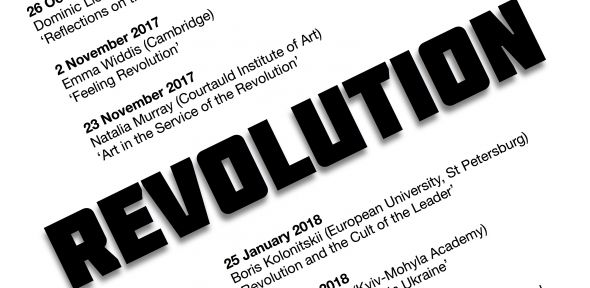
A century after the tumultuous revolutionary events of 1917, we still struggle to understand their complexity.
A new lecture series organised by the Cambridge Committee for Russian and East European Studies (CamCREES) and the Slavonic Studies Section at the University of Cambridge seeks to address this problem with public presentations by prominent scholars of both Russia and Ukraine.
Held in the Umney Theatre of Robinson College, the Revolution lecture series starts on Thursday, 26 October 2017 with ‘Reflections on the Russian Revolution’ by Professor Dominic Lieven (Trinity College), author of Towards the Flame: Empire, War and the End of Tsarist Russia (Allen Lane/Penguin, 2015).
Professor Lieven’s talk will be an international historian’s perspective on the Revolution. It will begin with an account of the strange fates of his grandfather and his siblings at this time. This is history ‘from below’, and the chaotic and often counter-intuitive story it tells is a useful antidote to overly-schematic retrospective surveys by historians of what happened. Lieven will then look at how Western interpretations of the revolution have evolved since he began his career in the mid-1970s.
‘What is commonly known as the “Russian Revolution” was in fact a series of revolutions,’ explains Dr Rory Finnin, Chair of CamCREES and Director of Slavonic Studies at Cambridge. ‘These revolutions were at times entangled and mutually antagonistic; they were not only about land and economic justice, but also about national self-determination and the abuses of colonialism.
‘They sparked the emergence of state projects – Soviet Russian, Ukrainian, Belarusian, and more – across the vast territory of the crumbling Russian Empire,’ notes Finnin. ‘What distinguishes this lecture series is our acknowledgement of this complexity and our incorporation of diverse, interdisciplinary perspectives from scholars of both Russia and Ukraine.’
Revolution is the newest instalment of a biennial thematic lecture series organised by the Slavonic Studies community at the University of Cambridge. Each lecture seeks to combine the primary theme of revolution with a secondary focus (e.g. empire, art, literature) with a view to the events of 100 years ago – and, when possible, to the present day – in Ukraine, Russia and beyond.
Download the lecture poster here. Below is the series schedule:
26 October 2017
Dominic Lieven (Cambridge)
‘Reflections on the Russian Revolution’
2 November 2017
Emma Widdis (Cambridge)
‘Feeling Revolution’
23 November 2017
Natalia Murray (Courtauld Institute of Art)
‘Art in the Service of the Revolution’
25 January 2018
Boris Kolonitskii (European University, St Petersburg)
‘Revolution and the Cult of the Leader’
8 February 2018
Mikhail Minakov (Kyiv-Mohyla Academy)
‘Cycles of Revolution in Ukraine’
23 February 2018*
Mark von Hagen (Arizona State)
'Revolution, War, and the Politics of National Self-Determination’
*Please note the Friday date
8 March 2018
Tamara Hundorova (National Academy of Sciences, Ukraine)
‘Revolution and Literature’





